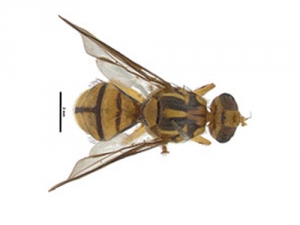MPI Hails Kiwifruit Boom as Horticulture Revenue Surges Past $9 Billion
Ministry for Primary Industries (MPI) Director General Ray Smith is giving a big shout-out to the horticulture sector, especially kiwifruit.
 It’s been a busy time for MPI and AsureQuality staff since they swung into action following the find of a single male Tau fly.
It’s been a busy time for MPI and AsureQuality staff since they swung into action following the find of a single male Tau fly.
It's been a busy time for MPI and AsureQuality staff since they swung into action following the find of a single male Tau fly on Thursday afternoon.
"MPI is working to find out if there are more Tau flies out there," says MPI's manager surveillance and incursion investigation, Brendan Gould.
Within 48 hours of the detection our teams set out 95 additional traps in the A Zone, the 200m area directly around where the fly was found in Manurewa.
The find of this single fly demonstrates how well MPI's lure-based surveillance trapping network is working. The network involves some 7600 traps set nationwide which are checked regularly.
Controls are in place to restrict the movement of some fruit and vegetables outside the defined circular area extending 1.5km from where the fly was found.
"These flies like to feed on pumpkins, melons, cucumbers, capsicum, zucchini, beans, mangoes, eggplant, papaya and passionfruit," says Gould.
"A full list of affected fruit and vegetables is available on MPI's website. We're asking people in the area to not move these off their property except to put them in the disposal bins provided.
"We appreciate that restrictions can be inconvenient but public support is vital to success and we've always had terrific community buy-in."
To find out whether your property falls within the control area, visit the MPI website www.mpi.govt.nz/tau-fly and enter your street address into their online search function.
If you think you might have seen a Tau fly in your area, please call the MPI helpline on 0800 80 99 66.
A solid recovery of global dairy prices this year makes a $9.50/kgMS milk price almost a shoo-in for this season.
As New Zealand marks the United Nations’ International Year of the Woman Farmer 2026 (IYWF 2026), industry leaders are challenging the misconception that women only support farming.
Fonterra’s impending exit from the Australian dairy industry is a major event but the story doesn’t change too much for farmers.
Expect greater collaboration between Massey University’s school of Agriculture and Environment and Ireland’s leading agriculture university, the University College of Dublin (UCD), in the future.
A partnership between Torere Macadamias Ltd and the Riddet Institute aims to unlock value from macadamia nuts while growing the next generation of Māori agribusiness researchers.
A new partnership between Dairy Women’s Network (DWN) and NZAgbiz aims to make evidence-based calf rearing practices accessible to all farm teams.

OPINION: Here w go: the election date is set for November 7 and the politicians are out of the gate…
OPINION: ECan data was released a few days ago showing Canterbury farmers have made “giant strides on environmental performance”.